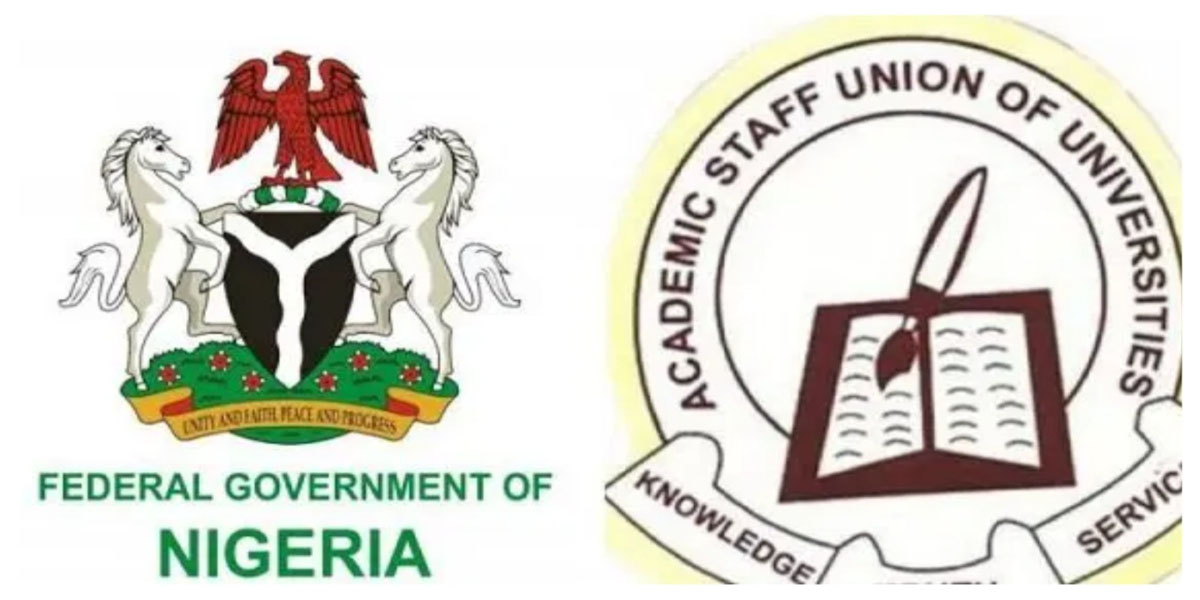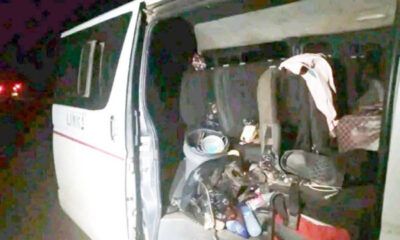Education
ASUP says new polytechnic service scheme won’t favour HND holders

ASUP says new polytechnic service scheme won’t favour HND holders
The Academic Staff Union of Polytechnics (ASUP), Federal Polytechnic Bauchi Chapter, has voiced concerns regarding the newly introduced Polytechnic Service Scheme.
The union, pointing out several contentious issues in the approved scheme, fears it will exacerbate the marginalization of Higher National Diploma (HND) holders compared to their counterparts with university degrees.
During an emergency congress held at the Senator Ali Wakili Complex, ASUP Secretariat in FPTB on Wednesday, Acting Chairman Esther Adebitan expressed that the scheme further entrenches discrimination against HND certificate holders in contrast to university graduates.
Adebitan emphasised that the Union fully supports the resolution issued by the Federal Ministry of Education and the National Board for Technical Education (NBTE), which gives a 15-day ultimatum to suspend the scheme in compliance with existing labour laws or face industrial action.
She said: “We affirm that Polytechnics cannot discriminate against its products in the manner prescribed in this document.”
“This is evident in the provision of discriminatory entry points into the Lecturer cadre for degree holders and HND holders; lowering the career progression bar of holders of HND both in the teaching and non-teaching cadres; discrimination against holders of HND in the appointment of Registrars and Bursars irrespective of their possession of higher level certificates; classification of technologists as non-teaching staff and so on.”
She mentioned that having deliberated extensively on the contents of the ‘controversial document’ and after further scrutiny by the Union’s Think Tank Committee, as well as the Council of National, Officers (CNO) of the Union, at the 110th meeting of the Union’s NEC, it hereby communicates the following specific findings:
“The document approved as Scheme of Service for Polytechnics contains significant and fundamental deviations from the document prepared by stakeholders in the sector and coordinated through a series of consultative engagements by the NBTE for over 6 years.”
“The document’s approval route which gave rise to the significant and contentious alterations is legally questionable as the role of The Office of The Head of Civil Service of The Federation as an approving authority is challengeable.
READ ALSO:
- President Tinubu swears in 8 new Permanent Secretaries
- CJN vows to deal with judges giving conflicting court orders
- Another attack on Benue community claims 10 lives
“Our conviction is that The Head of Civil Service of The Federation cannot be preparing or approving a document on career development of staff including assessment of such staff for career growth when she is neither an employer nor regulator.”
“The status of Nigerian Polytechnics was again brought to question by this controversial document. The tertiary educational institution status of Polytechnics is settled in different laws and policy instruments.”
“Therefore, the introduction of sub-tertiary level qualifications like in this instance the National Skills Qualifications (NSQ) as mandatory conditions for academic staff career growth is a misnomer as the possession of NSQ has no meaningful contribution to the delivery of the contents of the curricula of the different programs offered at the tertiary education level in Polytechnics.”
She stated further: “The contentious document curiously, unjustifiably and unacceptably elongates the career progression steps of the Lecturer cadre from a 7-step to a 9-step career development cadre and at the same time added an extra year for promotion to the final two levels.”
“This implies that anyone on the lecturer cadre will now endure a minimum of 26 tortuous years from the base to the highest level. This is not acceptable, particularly in view of the fact that this deviates from the norm in other sub-sectors and that the retirement age in the sector remains unchanged.”
“The unfair career progression guide in the sector particularly as it affects the teaching and non-teaching staff cadres is a recipe for crises as such is not reflective of the remuneration accruing to the cadres”
“The document was manifest with a proliferation of directorates with unsustainable financial implications on the overhead of the institutions. Equally, we view it as an act of duplicity for the NBTE to enter into a questionable Memorandum of Understanding with the Pharmacists Council of Nigeria on the issue of the status of the HND program in Pharmaceutical Technology run by Polytechnics, while at the same time creating a cadre which requires manpower of same qualification. This contradiction is unfortunate.”
“The release of documents by the NBTE subtly amending some provisions and seeking approval for amendment of others amounts to an admission of guilt and a halfhearted attempt at lifting the mourning mood in the sector imposed by the release of the contentious scheme of service.
“This is unsatisfactory and self-indicting on the commitment of the NBTE to the ideals and aspirations of the Nigeria Polytechnic System.”
.
The Nation
Education
ASUU, FG Reach New Agreement, Approve 40% Salary Increase from 2026

ASUU, FG Reach New Agreement, Approve 40% Salary Increase from 2026
The Academic Staff Union of Universities (ASUU) and the Federal Government of Nigeria have concluded negotiations on the renegotiation of the 2009 ASUU–FG agreement, with the new deal scheduled to take effect from January 1, 2026.
ASUU disclosed this in a statement published on its official Facebook page on Wednesday, announcing that the agreement was finalised on December 23, 2025, after prolonged negotiations. According to the union, the agreement will be reviewed every three years.
The renegotiated agreement places strong emphasis on improved welfare for university lecturers and enhanced funding for public universities. Key provisions include a 40 per cent salary increase for academic staff and significantly improved pension benefits.
READ ALSO:
- Brain Drain Deepens as 16,156 Nigerian Nurses Secure UK Licences Since 2017
- Sheikh Gumi Drags Two to Court Over Alleged Fake Threat Against Defence Minister
- Lagos Fire Service Battles Blaze at 25-Storey Great Nigeria Insurance House
Under the new terms, professors will earn pensions equivalent to their annual salary upon retirement at the age of 70, a move ASUU described as a major boost to post-service welfare in the university system.
The agreement also introduces a new funding framework for public universities, with dedicated allocations for research, libraries, laboratories, equipment, and staff development. A National Research Council is to be established to drive research and innovation, with funding pegged at a minimum of one per cent of Nigeria’s Gross Domestic Product (GDP).
Other provisions include strengthened university autonomy and academic freedom, the election of academic leaders such as deans and provosts restricted to professors, and assurances that no academic staff will be victimised for participating in past industrial actions.
ASUU urged the Federal Government to ensure the prompt and faithful implementation of the agreement, while also calling for the extension of similar negotiations to other university-based unions in order to promote lasting stability in Nigeria’s university system.
ASUU, FG Reach New Agreement, Approve 40% Salary Increase from 2026
Education
NOUN Student Dies After Collapsing During Examination at Victoria Island Centre

NOUN Student Dies After Collapsing During Examination at Victoria Island Centre
A student of the National Open University of Nigeria (NOUN), Michael Coker, has reportedly died after collapsing during an examination at the institution’s Victoria Island study centre in Lagos.
The tragic incident occurred around 11 a.m. on Tuesday, December 16, while students were preparing to sit for an examination. Witnesses said Coker suddenly collapsed inside the examination hall and allegedly lay unattended for several minutes while gasping for breath.
A fellow student, identified as Bukola, alleged that a female senior lecturer and invigilator prevented students from assisting the distressed student.
“It happened shortly after we entered the hall. Coker was standing when he suddenly collapsed. Another student held him and laid him on the floor,” Bukola said.
She claimed that the invigilator from a nearby hall ordered students to return to their seats instead of attending to the collapsed student.
“She kept chasing everyone away to continue writing the exam, even though he was on the floor gasping. When told a student had collapsed, she said in Yoruba, ‘E fi sílẹ̀, ó máa dìde’ (Leave him; he will get up),” Bukola alleged.
READ ALSO:
- Ojuelegba Bridge Gridlock as Container Truck Overturns in Surulere, Lagos
- Troops Foil Kidnapping on Otukpo–Enugu Expressway, Rescue Passengers in Benue
- Davido Joins Accord Party, Aligns With Uncle, Osun Governor Ademola Adeleke
According to her, Coker reportedly remained on the floor for over 15 minutes, during which students expressed concern and attempted to understand his condition, but were repeatedly stopped.
“It took several minutes before help came. Even moving him to a chair took another five minutes. By then, his breathing was very bad,” she said.
Bukola added that a nurse later arrived, administered first aid, and Coker was taken downstairs via an elevator. Students were reportedly instructed to continue with their examination and were only informed after the exam that Coker had died.
Another student and class representative, Prince Preskit, confirmed that Coker collapsed while attempting to log into the examination system.
“I think the invigilator initially wanted people to give him space. When it became obvious that it was serious, he was taken downstairs and rushed to the hospital,” Preskit said.
He disclosed that Coker was taken to Bonny Camp Hospital, but later died while being moved to another medical facility.
However, Bonny Camp Hospital denied claims that it rejected the student.
“The patient was not rejected,” a hospital official told Punch. “He was referred to another hospital where oxygen would be available.”
The incident has since sparked outrage among students, with many calling for a thorough investigation into the handling of the emergency during the examination.
NOUN Student Dies After Collapsing During Examination at Victoria Island Centre
Education
FG Spends Over ₦150bn on 788,000 Students Through NELFUND — Information Minister

FG Spends Over ₦150bn on 788,000 Students Through NELFUND — Information Minister
The Federal Government has disbursed over ₦150 billion to support about 788,000 students under the Nigeria Education Loan Fund (NELFUND) initiative, the Minister of Information and National Orientation, Alhaji Mohammed Idris, has disclosed.
Idris made this known on Monday in Abuja during the end-of-year media briefing, where he highlighted key achievements of President Bola Tinubu’s administration, particularly in the education sector.
According to the minister, 2025 marked a major milestone in targeted policy formulation and implementation, with a strong focus on empowering young Nigerians.
“NELFUND has now supported over 788,000 Nigerian students with interest-free education loans and stipends amounting to over ₦150 billion, and the figure is still increasing,” Idris said.
READ ALSO:
- US Offers $3,000, Free Flights to Undocumented Migrants Who Self-Deport Before Year End
- Presidency Denies Altering Tax Laws as Reps Probe Alleged Changes to Tinubu-Signed Bills
- Akpabio Raises Hope for Ibadan State Creation During Visit to Olubadan
He also announced that the Federal Government’s Investment in Digital and Creative Enterprises (iDICE) programme officially took off in 2025, backed by a multi-million-dollar venture fund aimed at boosting creative and digital entrepreneurship among Nigerian youths.
In addition, Idris revealed that the government launched the Student Venture Capital Grant (S-VCG) during the year.
According to him, the S-VCG provides equity-free funding of up to ₦50 million to undergraduate innovators in Science, Technology, Engineering, Mathematics, and Medicine (STEMM) disciplines across accredited tertiary institutions.
“With this intervention, Nigeria is nurturing entrepreneurship on its campuses and turning some of its brightest minds into job creators rather than job seekers,” he said.
The minister further noted that the Three Million Technical Talent (3MTT) programme recorded significant progress in 2025, as the government continues efforts to build Africa’s largest digital talent workforce.
FG Spends Over ₦150bn on 788,000 Students Through NELFUND — Information Minister
-

 metro2 days ago
metro2 days agoIbadan Explosion: Fayose Releases Documents, Claims Makinde Got ₦50bn from FG
-

 metro1 day ago
metro1 day agoNiger Delta Crackdown: Army Seizes ₦150m Stolen Oil, Arrests 19 Suspects
-

 metro2 days ago
metro2 days agoPlateau Kidnappers Demand ₦1.5m Each as 28 Muslim Travellers Remain in Captivity
-

 Sports2 days ago
Sports2 days agoCristiano Ronaldo Wins Best Middle East Player at 2025 Globe Soccer Awards in Dubai
-

 Sports2 days ago
Sports2 days agoAnthony Joshua injured as two die in fatal Lagos-Ibadan Expressway crash (plus photos)
-

 Opinion3 days ago
Opinion3 days agoHow a Misleading Channels TV Headline Reignited Nigeria’s Religious Tensions
-

 metro3 days ago
metro3 days agoNigerian Army Kills 438 Boko Haram, ISWAP Terrorists in Seven Months
-

 metro16 hours ago
metro16 hours agoOgun Man Arrested After ₦4,000 Debt Dispute Claims Stepbrother’s Life











